The Effect of Forced Marriage on Couples and Families
The expert Kasumi Nakagawa concluded her testimony today. She told the court about the impact of forced marriages, such as the husband and parents suffering under the deprivation of their responsibility for their spouses and children, as well domestic violence taking place in more households that were subject to forced marriages than those that had not. She was questioned by the Nuon Chea and the Khieu Samphan defense teams about the methodology and representativeness of her studies.
Consummation of Marriage and Psychological Impact
The floor was granted to the Civil Party Lead Co-Lawyers to conclude their questioning of the expert Kasumi Nakagawa. Marie Guiraud asked about rapes that took place in forced marriage and wanted to know whether this frequently took place and whether it was frequent to denounce rapes. Ms. Nakagawa said that her research that related to non-forced marriage had not examined this aspect. As for couples who were subject to forced marriage, they were spied upon.
“They had to complete it and it was impossible to avoid it. In case spies knew that they were not consuming their marriage, or in some cases husbands reported to the Khmer Rouge that their wives did not agree to have sex […], then the consequences would be a punishment. It could be arranged in a punishment in a form of a detention center, […] re-education, sexual violence against the wife, or the husband, or both, or it could be the punishment to death.” Rape that occurred during forced marriage was not denounced, because they knew that it was their duty to consume their marriage.
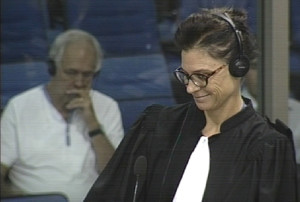
International Civil Party Lead Co-Lawyer Marie Guiraud
The mother of a bride “suffered most”, because the mother of a bride had the responsibility to arrange the marriage for her child and ensure that her daughter had a “happy life”. “They were deprived of this responsibility”. If children were born out of these forced marriages, this had a lasting impact. In many families, “the study shows that […] if parents the prevalence of domestic violence, particularly from husbands, is higher than in non-forced marriages”.
Ms. Guiraud then wanted to know if the couples who separated were stigmatized, and if yes, how. She replied that the majority did not separate. Many looked at their forced marriage as “the beginning of a long journey”. Many carried emotional trauma through this. “They tried to move forward by covering up the dark past”. Since many had children, they stayed together and tried to create a happy future by creating a family.
The president informed the International Civil Party Lead Co-Lawyer that she did not have any more time to put questions to the expert.
Questions by the Bench
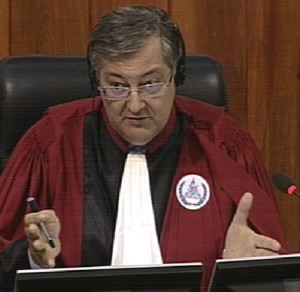
Judge Jean-Marc Lavergne
Judge Jean-Marc Lavergne inquired about a “blind agreement” that she had mentioned and wanted to know whether the children who were married pre-1975 trusted their parents in terms of the choice that the parents had taken for them. Ms. Nakagawa confirmed this. “The daughter was expecting her parents to decide on her marriage”. “There was a mutual trust. The daughters trust their parents that they would make the best-possible decision”. This was different under the Khmer Rouge: “Agreement or consent was done out of fear of being killed”. Judge Lavergne asked whether the lack of trust toward Angkar could not also be explained through the trauma the people had experienced, such as through the evacuation of Phnom Penh, being separated from their families, and the fear of belonging to a “wrong social category”.
As for the use of violence, she said that: “Violence was really rampant even before the Khmer Rouge. However, they did not see it as a symbol as a terror. [They saw it] as a symbol of affection, a symbol of guidance. [..] It’s a part of their affectionate way of education for personal development, whereas under the Khmer Rouge time, violence was only used as a systematic tool […] to generate the terror under the Khmer Rouge”
Judge Lavergne then inquired whether Angkar replaced the husband in the role of protection when the husbands were absent. She replied that during the Khmer Rouge time, men and women were separated. They were assigned collectively. “The Angkar, the Khmer Rouge, did not give any single protection for a woman, or children, or the husband”. She said that “there was no safety net”. During Khmer Rouge time, fathers were deprived of their right to provide protection to their families and suffered under this. The Khmer Rouge did not provide special protection to expectant mothers, who had special needs to ensure their reproductive health. Their request for leave due to morning sickness, for example, was not granted.
Judge Lavergne asked how Angkar understood relations between children and their natural parents. “During the Khmer Rouge time, the family unit did not exist”, she said. When mothers were breastfeeding their child, the children were allowed to stay with their mothers during the night and mostly during lunch time. The rest of the day, the mother had to work. When the mother stopped breastfeeding, the mother was not allowed to see her child during lunch time either. Old women took care of the children instead. Once a child was understood to “work for the revolution”, they were put in the children’s unit. Many were allowed to go back to their mother at night time. The life of single boys or single girls was very harsh, she said. “The family as we assume now did not exist. They were completely dismantled. [..] They had no freedom. […] If the children wanted to visit their mother, they had to ask for permission, which was often not granted”. When mothers wanted to visit their children, because they were sick, for example, they also had to ask for permission. This permission also often remained not granted. With this, Judge Lavergne concluded his questioning.

Judge Claudia Fenz
Judge Fenz wanted to know whether she understood it correctly that she had not interviewed Khmer Rouge cadres who had arranged weddings or matched couples. Ms. Nakagawa said that she remembered only one interview with a Khmer Rouge. She explained that this person had taken special care of his wife by hiding food to ensure that she liked him. “I failed to ask how he organized the wedding”.
Asked about marriage pre-Khmer Rouge, she said that the wedding were family matters. They arranged marriages for the best interest of the families by believing that this was the best interest for a child. It was difficult to accept for a family to accept a husband of lower social standing. However, she could not recall any account of families pressuring the couples to divorce – they tried to accept.
Handicapped soldiers “could choose anybody”. In other areas base people were met with base people and new people with new people.
The presiding judge Ya Sokhan said that they had received a request by the Nuon Chea Defense Team for an oral submission to admit two documents that they intended to use with this expert. Nuon Chea Defense Counsel Doreen Chen said that they wanted to ask whether there were any differences or similarities between the methodologies between a report by Ms. Broth and the one by Ms. Nakagawa.[1] Both were conducted under the umbrella of the Cambodian Defenders Project. No parties had objections to this request.
Role of Women in Cambodian Society
National Nuon Chea Defense Counsel Liv Sovanna started his line of questioning by inquiring whether she did research on cultural traditions through for example looking at poems or Khmer literature review apart from her interviews. She said that she only read one book and did not conduct a full literature review, but that she often talked to her students about this. She confirmed having read Tom Teav. “I have been working on gender issues for more than ten years […] and through this work I have collected enough information to say what the custom is”.
Mr. Sovanna asked whether she had heard of the proverb “the cake is not bigger than the cooker”, as mentioned by 2-TCCP-274. She confirmed this and said that she had heard of many proverbs that were discriminating against women, such as this one. It instructed women to be “submissive, to be obedient, and to follow the instructions of the parents”.
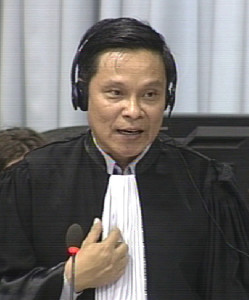
National Nuon Chea Defense Counsel Liv Sovanna
Mr. Sovanna wanted to know whether the parents agreed to the marriage of a rich and a poor child prior to the Khmer Rouge if they loved each other. She said that they did not try to match their children from different social backgrounds. The marriage was possible if a rich man proposed to a woman from a poor background and negotiations were concluded. The opposite was almost impossible, she said.
At this point, the President adjourned the hearing for a break.
Judge Fenz issued the ruling on the request to admit the two documents. They were admitted.
The floor was granted to Liv Sovanna to continue his line of questioning. He wanted to know whether it was correct that pre-1975, marriages were arranged according to social and economic status. She replied that there would be some exceptions, but that this was correct in general terms. Mr. Sovanna inquired whether some couples were prevented from marrying because of their social status before the Democratic Kampuchea regime. The expert answered that some would not dare to propose. Before the Khmer Rouge time, she could not recall any woman who proposed her own marriage to her parents. The daughters agreed to the marriage, “because of the trust from the daughter to the parents and also to show their respect to their parents and to also pay back their gratitude to their parents. It was extremely rare that she agreed with their parents’ decision due to her passion to the man she was getting married to”. The daughters had to follow the decision of their parents and were waiting for them to make a decision for them. Mr. Sovanna asked whether the proverb “A cake should not be bigger than its mold” influenced the arrangement of marriages. Ms. Nakagawa said that it was interesting that he raised this proverb again. She explained that the whole structure, including this proverb, were instructing the daughters to be obedient. “It’s misleading to just quote one proverb”. Mr. Sovanna asked whether the decisions by the parents violated the daughters’ rights as to making her own choice. She replied that the decision was very different prior to 1975. “The parents were obliged to find the best option for their daughter’s future”, and the daughters internalized this. When sons reached reproductive age, such as 18 or 19, parents started to look for appropriate spouses for their sons.
Traditions
He quoted Ebihara about the ceremonies prior to the Democratic Kampuchea regime.[2] Asked about the wedding traditions, she said that “Personally I agree it’s a waste, but traditionally it is very very important, so they don’t think it’s a waste.” The expenditures depended on the negotiations. Sometimes the wedding ceremony expenditures would exceed the dowry.
Mr. Sovanna inquired whether the agreement of the authorities had to be sought by law or informally. She replied that she said that it was by law, but that it was mostly done informally. The participation of the local authorities in the wedding as such was seen as approval by the local authorities. However, none of the women told her that they specifically needed the approval of the authorities. She recounted the story of one woman who was prohibited from having a big wedding due to the fear of bombardment. They were instructed by the chief to not use loud music, much light, and to keep the wedding short. Buddhist monks were present during the weddings. The presence of an ajar was fundamental to the ceremonies.
She saw photograph of weddings that showed grooms and brides being surrounded by elders when they were given blessings and advices. It was rare that parents would inquire about the consummation of marriage. From her interviews, she did not recall any case in which a husband would force himself onto the newlywed wife. She replied that she could not recall any such incident, but that it could happen until today and that she could therefore not say no. Judge Fenz instructed the defense counsel to limit his questioning to those that were legally relevant.
Ms. Nakagawa said that there was a “knowledge gap” between 1975 and the end of 1980. They did not have accounts on how people got married immediately after the Khmer Rouge. “In my opinion, Cambodia has gone through a dramatic socio-economic change – that we may call revolution – due to globalization […]. Many women are making their own decisions to point out who they want to marry, and vice versa. But I still see traditions”. This applied in particular to daughters, but also unmarried men who were in their thirties.
She had asked many people what slogans they remembered from the Khmer Rouge time. She rarely heard the proverb that Angkar were their parents, but said that she might have heard it once or twice. She said that this may have been due to a loss of memory though.
Mr. Sovanna quoted the testimony of a Tram Kok village chief (2-TCW-919), who had testified in May 2015. This person said that villagers called the unit chief “mother”. Ms. Nakagawa said that children were very afraid of village chiefs. She did not find what he had read out to the area in which she had conducted interviews.
When Mr. Sovanna asked a question that had been put to her yesterday already, Judge Fenz interrupted and said that he should refrain from asking repetitious questions.
The expert explained that they had to make an oath that they agreed to marry for Angkar from their own will.
Mr. Sovanna then inquired whether the two types of marriages happened in different locations – the ones that were forced and those that were not. She answered that it was mixed. Similarities between weddings of poor families prior to Democratic Kampuchea and during the regime were that the ceremonies were simple. However, even poor families provided some special foods such as fruits. Parents and the family still attended the weddings ceremony. As his last question, he asked why some of the 12 Revolutionary Principles were not implemented.
At this point, the President adjourned the hearing for a break.
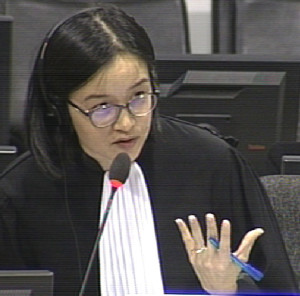
International Nuon Chea Defense Counsel Doreen Chen
Ms. Chen wanted to know to what extent the chab srey was taught in Cambodian education today. She replied that it was taught in primary schools until 2006 or 2007. The CEDAW Committee recommended the Cambodian government to stop teaching chbab srey, since it was a symbol of oppression of women. It taught to be “obedient”, “nice” and to “serve the husband”. Many women still were very obedient to their parents, she said. They had internalized the chbab srey. In rural areas, she estimated that around 90 percent waited for the assignment of their parents to have a husband. In Cambodian history, approval was necessary in terms of marriage. Ms. Chen asked whether the expert knew of any other countries in which it was required to get approval by the authorities before getting married. For example, Ms. Chen said, she had to submit an “extensive dossier” for her own marriage when getting married under French law, following which the authorities checked whether her marriage would be approved. Judge Lavergne interjected and said that the French law merely verified whether the consent given by spouses was an informed one. They did not prevent people from getting married, he said. Judge Fenz clarified that Ms. Chen might have had been subject to approval, because she was not a citizen of the country. Ms. Nakagawa said that there was one example of a same sex couple requesting to get married in Cambodia and was denied authority to do so.
Marital Rape as a Crime
Moving to the next topic, Ms. Chen asked about a training she might have undergone in Japan. The expert said that when she went to university, no scholar was trained with regards to the Khmer Rouge, so she had no training in this respect.
Ms. Chen read an excerpt of an interview that Pol Pot gave on 5 August 1978, which related to marriages, an excerpt of a witness’s testimony about the 6th Revolutionary Principle, and lastly the one of a witness that said that both spouses, community and parents had to agree to a marriage.[3] Ms. Chen said that it seemed to suggest that the top-level had a policy that both spouses had to agree. Ms. Nakagawa replied that this did not seem like sufficient evidence and that a policy could not be derived from these three documents.
She said that the people she interviewed knew that they would be tortured or imprisoned, even if only a small number of people actually experienced this.[4]
Ms. Chen then asked about two individuals who worked at the district and commune level had said that the rule was that the consent should be thought, but that there was room or discrepancy. Ms. Nakagawa said that it indeed depended on local authorities and that she could not find evidence for a central policy. Approximately half of the people who married under the Khmer Rouge were forced, according to her estimate.
The Khmer Rouge wanted to show that they were in control.
Ms. Chen then quoted an excerpt and asked about sexual violence.[5] The expert said that “any sexual violence is an abuse of power.” Ms. Chen then wanted to know why rape during forced marriage would be considered legalized rape and not considered a crime under Democratic Kampuchea regime. She explained that in the ordinary circumstances, if men and women raped another man or woman, this was considered a crime. Since the Khmer Rouge forced couples to marry and they were forced to consummate their marriage. Ms. Chen inquired how common or uncommon it was for countries to criminalize marital rape. She said that she thought it was not very common, but that she did not have much information on this. Ms. Chen then asked how many people were arranged to marry handicapped soldiers. She said that she had no answer for this and that they should ask the Khmer Rouge.
“I would try to avoid any discriminatory comments, but at that time […] both men and women were living under extraordinary hardship, and adding any burden should be avoided by any means, and unfortunately marrying with the ordinary person, even against their own will, for their survival, was rather acceptable, in contrast to marrying a man with disability that would require a huge protection or care”.
Methodology
Ms. Chen asked whether it was correct that she undertook the field research relating to forced marriage from April 2006 until January 2007. She said that the field research was conducted until September or October of that year. The Open Society Justice Initiative sponsored her research. She did not receive any guidance by this organization.
Ms. Chen said that the report set up by Bridgette Toy-Cronin had as a goal to support the prosecution at the ECCC. Ms. Nakagawa replied that at this time she did not believe that the tribunal would be set up. They had destroyed all evidence subsequently. The Cambodian Defenders Project had carried on “her passion”, she said. The research was done on a “super-confidential basis”, and thus she could not give them information. There were many volunteers who were suffering from domestic violence. Ms. Chen wanted to know whether it was correct that Bridgette Toy-Cronin was an intern at the time, which the expert confirmed. She came from Harvard University.
She only met those people who were “very committed” and who helped her arranging the field work. They informed them to collect information on what was being said, how they received this information, et cetera.[6] They had to ensure that they did not receive the information through hearsay, or had actually witnessed or experienced this. She estimated that around ten of the 1,500 people who were interviewed had indicated that they were forced to marry. If any of them crossed the first step to indicate their willingness to disclose information about their forced marriage, Ms. Nakagawa assumed that they actually experienced it. She assumed that many lied about it and indicated that they were not subject to forced marriage.
At this point, the President adjourned the hearing for a break.
Representativeness of the Studies
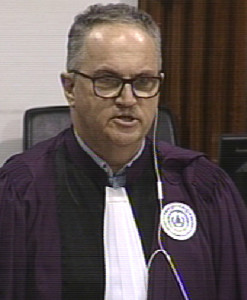
International Deputy Co-Prosecutor William Smith
After the break, the Nuon Chea Defense Team took up their questioning again. In place of Ms. Chen, Mr. Victor Koppe continued the examination. Mr. Koppe asked about the representativeness of the people she interviewed. She said that her assistants knew that the purpose was to find women who had suffered from sexual violence. Not everyone found only women who experienced sexual violence and interviewed also those who had not to fulfil their quota. Mr. Koppe asked whether it was not one of the rules that a random sample should be collected, whereas her research first collected people who had already been connected to sexual violence. She agreed with this, but said that her research aimed at collecting the stories of sexual violence of women. She denied that these 100 people they had selected were connected to forced marriage. These 100 were most likely to have been victims to sexual violence. Of these, around perhaps ten had been subject to forced marriage. Mr. Koppe asked whether it therefore meant that her research was more anecdotal evidence instead of a representative sample. At this point, Deputy Co-Prosecutor William Smith objected and said that she had given evidence in relation to three reports she had drawn up. Mr. Koppe wanted to know whether there were was no basis whatsoever to make any generalizing conclusions. She answered that her research did not relate to any policy.
Mr. Koppe asked what it was in her other research that made her allow to draw general conclusions. She said that they explicitly asked about sexual violence in the first two reports. From having interviewed “so many people”, she could draw general conclusions. Her first two researches were biased in that sense, because she only targeted those people who experienced sexual violence. The third survey focused on pregnant women. Within this context, many women talked about marriages. It was done in a “random way” by visiting villages and going from door to door. In this sense, it was not biased toward people who had experienced forced marriage.
Follow-Up Questions
Khieu Samphan Defense Counsel Kong Sam Onn asked whether she noted the age range of the people she interviewed. She could not recall the age range of her first survey. She was planning on doing research on the percentage of people who were forcibly married under the Khmer Rouge from next month onward, but had not done so until now. He asked whether marital rape was “really codified” before 1979. She denied this, but explained that rape was codified as a crime beforehand, which she said should include marital rape. She said that she thought that the Cambodian law even nowadays did not specify martial rape as rape. Mr. Sam Onn wanted to know how parents would try to encourage the daughters to accept the proposal. The traditional marriages meant that they did not register their marriages at the office. This was required during Democratic Kampuchea. They were recognized as wife and husband.
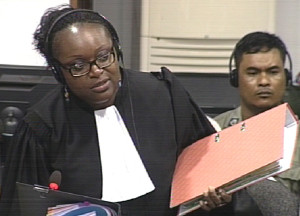
International Khieu Samphan Defense Counsel Anta Guissé
With this, Mr. Sam Onn gave the floor to his colleague Ms. Anta Guissé, who asked whether there were questions in her questionnaire that aimed at the particular locality and local authority that were managing the area that the people she interviewed came from.[7] Ms. Nakagawa denied this. They did not have questions directed at the rule of marriages and who presided over the marriages. They only asked about this in the in-depth interviews. She confirmed that she was the one who used the term “the Khmer Rouge” and not always the interviewees. As for pre-Democratic Kampuchea, most of women became married before they were 20. Parents would start looking for the husband at the age of around 14 or 15. This age was older before Democratic Kampuchea. Before the Khmer Rouge time, women were “suppressed to think about sexuality” and they “did not have any idea about love”. Ms. Guissé asked whether in that term it was similar under Democratic Kampuchea that it were the cadres who decided on the spouses instead of the family. Ms. Nakagawa confirmed this. Those who were forced, however, were different. “The lack of love or affection might have been the same, but they were living under extreme fear”.
Ms. Guissé asked whether an arranged marriage would have lasted after the Democratic Kampuchea regime, putting a parenthesis over the Khmer Rouge regime. She said that this tradition remained and that many girls thought it was still very important. To her knowledge, child marriages became rare after the Democratic Kampuchea regime. They were very rare, except under ethnic minorities.
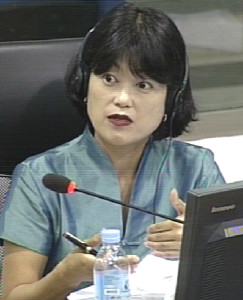
Expert Kasumi Nakagawa
Ms. Guissé inquired about Motherhood of War, and wanted to know whether 200 people participated in this study.[8] Ms. Nakagawa said that it was correct for the field trips. They had conducted training beforehand. There were 500 participants prior to the field trips. Ms. Guissé asked whether she carried out any statistics on the elements of her interviews. Before they met 200 people, they did not have any criteria except that they became pregnant, or whose wives became pregnant, during the Khmer Rouge. The quantitative data included age, sex, status (Base Person or New Person) according to the Provinces. She still had all the documents, including the tape recording, for the second and third report. She was also still in possession of the set of data. They did not specifically ask about divorce under the Khmer Rouge, but they had interviewed one woman who was forced to marry under the Khmer Rouge. The village chief granted the divorce, after the woman went to him together with her mother when her husband was “very very abusive”. Ms. Guissé asked whether a wife could ask for help or mediation when there were problems in the relationship, such as domestic violence. Ms. Nakagawa said that it was not common that a woman suffering from violence on the hands of their husband would disclose such information to outsiders, including their mothers. In one of her questionnaires, there was a question about domestic violence. The common answer was that there was no domestic violence. One of the reasons was that the couples would rarely meet, maybe once, twice or three times a month. They would therefore not argue during that time. Moreover, if there were problems, the couple would be punished. Children were also rarely hit, “because they missed each other so much”.
With this, Ms. Guissé concluded her questioning of the expert. Presiding judge Ya Sokhan thanked the expert and dismissed her. He then adjourned the hearing. It will continue tomorrow at 9 am with the testimony of 2-TCW-854 and reserve Civil Party 2-TCCP-284.
[1] E3/9240.
[2] E3/9614, at 00217340 (KH), 01037039 (EN).
[3] E3/76, at 00170426 (EN), 01327012 (KH), no French translation available; Transcript of May 5, 2015. E3/5293, at 00351705 (EN), 00348844-45 (KH), 00367751 (FR).
[4] E3/2995, at 00421892 (EN), 00701496 (FR), 00738346 (KH); 00421892-94 (EN), 00701496-97 (FR), 00738346-48 (KH).
[5] E3/2959, at 00421893-94 (EN), 00731495 (FR), 00738346-47 (KH).
[6] E3/3416, 00449502 (EN).
[7] E3/2959.
[8] E3/10655.
Featured Image: Expert Kasumi Nakagawa (ECCC: Flickr).
